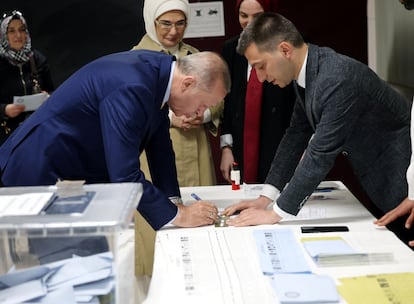Erdogan’s party suffers heavy setbacks in Turkish local elections
The social democratic Republican People’s Party will govern five of the most populated cities in the country


President Recep Tayyip Erdogan’s Justice and Development Party (AKP), which has solidly dominated elections in Turkey for the past two decades, obtained disastrous results in the municipal elections Sunday. It failed to regain the mayorships of Istanbul or Ankara — which it lost in 2019 — and important conservative fiefdoms fell to the candidates of the main opposition party, the social democratic Republican People’s Party (CHP), and even to AKP’s far-right allies. Of the 10 most-populated cities in the country, which account for half of the population, the AKP only managed to maintain three, while the CHP won in six (five of them the most densely inhabited, including Istanbul and the capital, Ankara) and the Islamist party YRP won one.
It has been decades since Turkey’s electoral map has been painted red, the color of the CHP, the center-left party created by the country’s founder, Mustafa Kemal Atatürk. And this despite the division among the opposition: the harsh defeat last year, in which Erdogan managed to get reelected as president even with the polls against him, put an end to the opposition coalition between the CHP, the right-wing nationalist IYI, several small right-wing parties and the tacit support of the Kurdish left. Not only that, but the CHP had also begun a process to renew its leadership after a complicated congress that divided the center-left party. “Turkey has decided to opt for a new policy,” Özgür Ozel, leader of the CHP, declared on Sunday. “It is a message that must be taken note of,” he said in a speech, visibly moved.
The coalition formula was tested for the first time in the 2019 local elections, and achieved good results: it won in Ankara and Istanbul after a quarter of a century of Islamist municipal government. However, in these elections, the CHP mayors ran without the support of their external allies. In contrast, the AKP mobilized all state resources and President Erdogan actively participated in its campaigns. And yet, the center-left mayors managed to withstand the challenge: in Istanbul, the popular Ekrem Imamoglu won with 50% of the vote and a nine-point lead over his opponent — making him a potential candidate in the next presidential elections — and, in Ankara, the difference was even greater: the CHP had a 25-point advantage over the AKP candidate.
In the country’s third-biggest city, Izmir — a bastion of secularism — the CHP retained its control despite losing votes. But the big surprise was in Bursa, the fourth-largest city, which is considered an AKP stronghold: the CHP candidate won by seven points. What’s more: the CHP retained control over the Mediterranean coast and won throughout the interior Aegean — usually the fiefdom of right-wing parties — and even in several provinces of the very conservative Inner and Eastern Anatolia.
After midnight in Turkey, Erdogan appeared on the balcony of his party’s headquarters, where he usually gives his victorious speeches. This time, he was in front of a much smaller audience than usual. “We have not achieved the results we expected,” he acknowledged, arguing that “the real winners are not the candidates, but the Turkish nation.” “We have demonstrated the maturity of Turkish democracy. The most critical day of democracies are elections, when the will of the nation is expressed,” he said.
Erdogan said that this was not an end, but that — without making it clear whether he was referring to his party or to himself — he “will continue its path” after drawing conclusions from the results. The president — who announced a few weeks ago that he would not be a candidate in the next presidential election — added that his government will continue with its current economic stabilization policies and will increase military operations against the Kurdish armed group PKK in Syria and Iraq.
Erdogan’s AKP was hurt by its decision to present candidates without much renown, with a technocratic profile, who were seen as simple extensions of the central government. Other factors were the economic crisis, with skyrocketing prices (inflation has not fallen below 60%) straining families, and the constant accusations of corruption against the party’s leaders.
Competition within their own camp also hurt the AKP. Although, in many provinces, the AKP ran in a coalition with its partners from the far-right (MHP and BBP), in others, they competed separately, and that’s where the partners won, stealing several provincial cities. For Erdogan, the biggest blow is the rivalry that has emerged on the right with the Islamist YRP party, founded by Fatih Erbakan, the son of his political mentor. The YRP won the city of Sanliurfa — the eighth-largest in the country — and the provincial capital of Yozgat, both previously controlled by the AKP.
Two dead and irregularities in the Kurdish southeast
Election day took place in the middle of Ramadan in a country where between half and two-thirds of adults observe the mandatory fast of the Muslim holy month. Around 77% of voters went to the polls, down eight points from the previous local elections. While in general there were no problems, clashes occurred in some locations in the southeast.
The most serious took place in the village of Çirnik (Diyarbakir), where a confrontation between supporters of two mayoral candidates ended in a fight with sticks, stones and shooting. A delegate of the pro-Kurdish DEM party died, and 11 other people were injured. In Siirt province. there was a similar clash between supporters of village mayors, in which one person died and four others were injured. In neighboring Sanliurfa, there were several fights, with more than a dozen people injured.
Various irregularities were also reported in these provinces. For example, the Human Rights Association (IHD) claimed that a candidate of the ruling AKP bought 1,200 votes from four villages in Diyarbakir for €57,000 ($61,500) and that in Halfeti (Sanliurfa), a group of armed people voted as a group, contravening the rules of a secret, individual vote. According to the IHD, an AKP candidate also tried to vote with a hundred people (in some of these Kurdish provinces, family clans are still very influential, and candidates negotiate the vote directly with them).
But most of the complaints concerned the large influx of soldiers and police to the polls in these provinces, which Democrat Party (DEM) spokesperson Aysegül Dogan denounced as “an attempt to subvert the popular will.” According to Turkish law, members of the security forces can vote in local elections in the municipality where they are deployed, even if they are not registered in that electoral roll, but the DEM maintains that this provision was abused to sway the balance of forces.
According to this leftist party, which posted numerous videos of hundreds of young men queuing to vote — supposedly soldiers and police — nearly 47,000 members of the security forces voted as “deployed” in the Kurdish region. In some provincial capitals such as Kars, Igdir and Siirt, where the Kurdish left won the 2019 elections over the AKP and its far-right ally MHP by between 1,200 and 1,600 votes, the number of members of the security forces who voted on Sunday was equivalent to 10% of the electoral roll. In others, like Sirnak, the number reached 20%.
Despite this, the DEM managed to win most of the cities in the east and southeast, except in Sirnak and Kars, which it lost to the AKP and the MHP, respectively, by a few thousand votes. The question now is whether the Turkish government will allow the DEM to govern or intervene, as has happened on previous occasions, alleging the party’s ties to the PKK armed group.
Sign up for our weekly newsletter to get more English-language news coverage from EL PAÍS USA Edition
Tu suscripción se está usando en otro dispositivo
¿Quieres añadir otro usuario a tu suscripción?
Si continúas leyendo en este dispositivo, no se podrá leer en el otro.
FlechaTu suscripción se está usando en otro dispositivo y solo puedes acceder a EL PAÍS desde un dispositivo a la vez.
Si quieres compartir tu cuenta, cambia tu suscripción a la modalidad Premium, así podrás añadir otro usuario. Cada uno accederá con su propia cuenta de email, lo que os permitirá personalizar vuestra experiencia en EL PAÍS.
¿Tienes una suscripción de empresa? Accede aquí para contratar más cuentas.
En el caso de no saber quién está usando tu cuenta, te recomendamos cambiar tu contraseña aquí.
Si decides continuar compartiendo tu cuenta, este mensaje se mostrará en tu dispositivo y en el de la otra persona que está usando tu cuenta de forma indefinida, afectando a tu experiencia de lectura. Puedes consultar aquí los términos y condiciones de la suscripción digital.








































